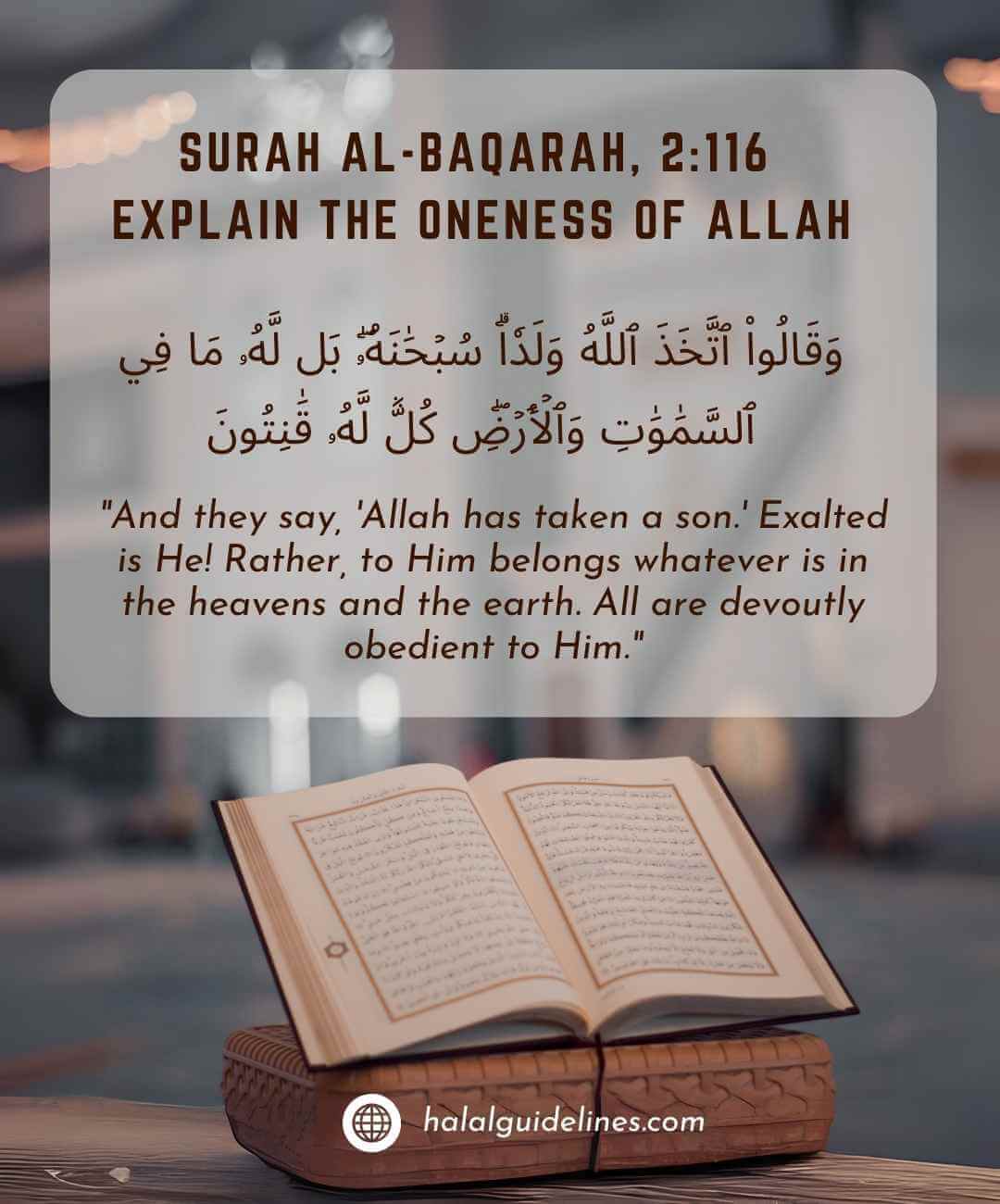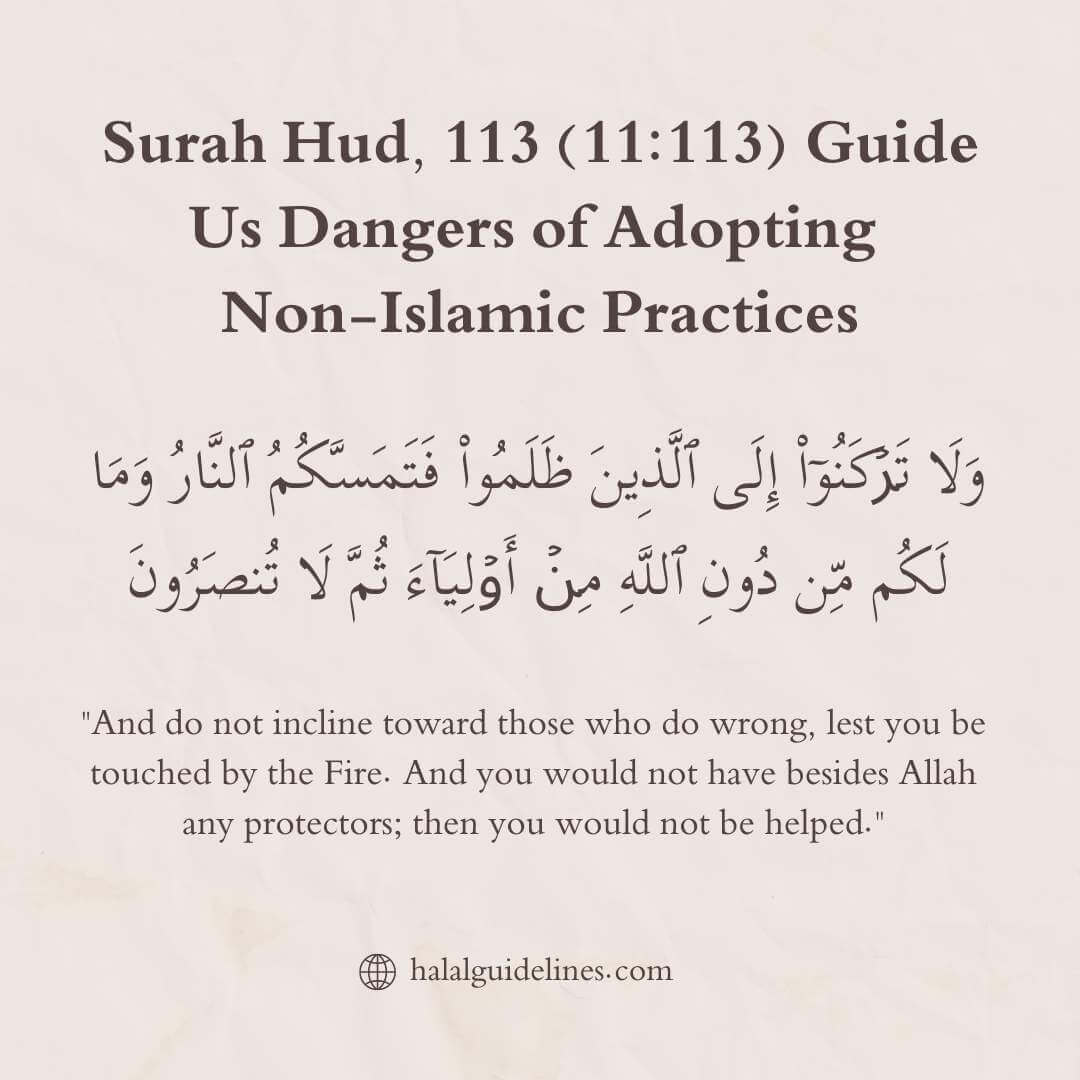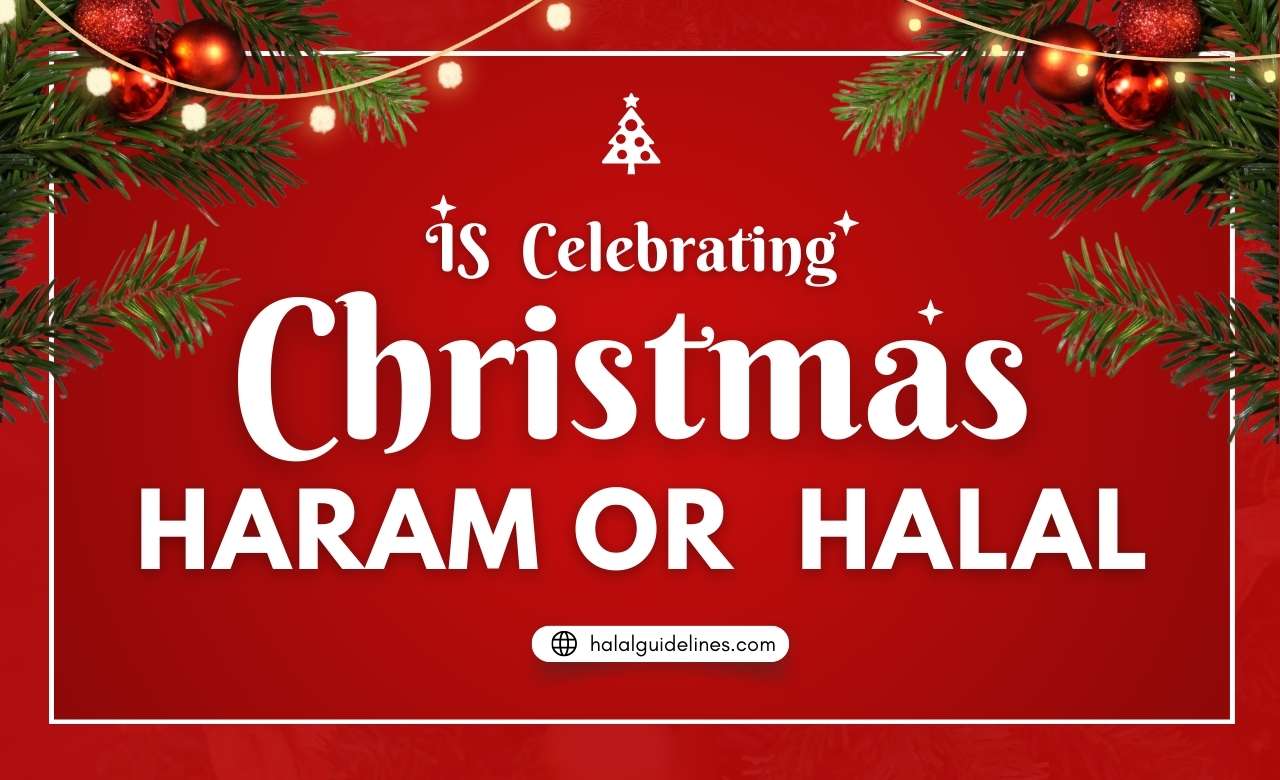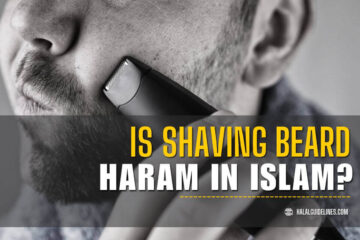Islam teaches that Jesus was a prophet, not the son of Allah. Celebrating Christmas is seen as possibly agreeing with Christian beliefs about God that do not match Islamic teachings about worshiping only one which is Allah.
What Does the Quran Say About Such Events Like Christmas?
Islam provides clear guidance on maintaining the purity of belief in one Allah and avoiding participation in events that go against its principles. The Quran and Hadith highlight the importance of preserving the oneness of Allah and staying away from practices that involve shirk.
Surah Al-Baqarah, 2:116 Explain the Oneness of Allah
وَقَالُواْ ٱتَّخَذَ ٱللَّهُ وَلَدٗاۗ سُبۡحَٰنَهُۥۖ بَل لَّهُۥ مَا فِي ٱلسَّمَٰوَٰتِ وَٱلۡأَرۡضِۖ كُلّٞ لَّهُۥ قَٰنِتُونَ
“And they say, ‘Allah has taken a son.’ Exalted is He! Rather, to Him belongs whatever is in the heavens and the earth. All are devoutly obedient to Him.”

This verse denies the notion that Allah has a son or any familial relationship. It reaffirms His absolute authority and uniqueness.
Surah Hud, 113 (11:113) Guide us Dangers of Adopting Non-Islamic Practices
وَلَا تَرۡكَنُوٓاْ إِلَى ٱلَّذِينَ ظَلَمُواْ فَتَمَسَّكُمُ ٱلنَّارُ وَمَا لَكُم مِّن دُونِ ٱللَّهِ مِنۡ أَوۡلِيَآءَ ثُمَّ لَا تُنصَرُونَ
“And do not incline toward those who do wrong, lest you be touched by the Fire. And you would not have besides Allah any protectors; then you would not be helped.”

This verse warns against adopting the practices or following the customs of those who stray from the truth. Muslims can risk losing their religious identity and facing consequences in the Hereafter.
History of Christmas and Why It is Considered Haram (Forbidden)

Christmas originated as a Christian celebration commemorating the birth of Hazrat Essa (A.S) (Jesus Christ), traditionally set on December 25th. Historically, this date was strategically chosen to coincide with pagan winter solstice celebrations like the Roman Saturnalia and the birthday of the Persian god Mitra.
The first recorded Christmas celebration on December 25th occurred in 336 AD during Roman Emperor Constantine’s reign, who played a crucial role in establishing Christianity as the Roman Empire’s official religion.
The evolution of Christmas reflects a complex blend of religious, cultural, and eventually commercial traditions. Early Christian leaders intentionally aligned the celebration with existing pagan festivals to facilitate conversion, gradually transforming it from a religious observance to a global cultural phenomenon.
The modern Christmas, with its highlights on gift-giving, family gatherings, and secular celebrations, emerged primarily during the 19th century, particularly in the United States during the Industrial Revolution.
From an Islamic perspective, this historical and theological context makes Christmas a problematic celebration that fundamentally contradicts Islamic principles of monotheism and religious identity.
Read more about:
- Is Thanksgiving Haram Or Halal?
- Is Halloween Haram In Islam?
- Is Backbiting (Ghibah) And Gossip (Namimah) Haram?
8 more reasons celebrating Christmas is haram
1. Shirk (Associating Partners with Allah)
The Christian belief that Jesus is the son of God directly contradicts the Islamic principle of Tawhid (absolute monotheism). Islam firmly asserts that Allah is one, indivisible, and has no offspring or partners. Celebrating Christmas can be seen as indirectly supporting this theological concept, which is the most serious religious violation in Islam.
2. Rejection of Divine Oneness
Islam strictly teaches that Allah is the only creator of the universe, with no partners, children, or family ties. The Christian story of Jesus’s holy birth goes against the Islamic belief in Allah’s absolute uniqueness and independence.
3. Imitating Non-Muslim Religious Practices
Islamic teachings discourage Muslims from imitating or participating in religious practices of other faiths. Saying “Merry Christmas” or engaging in Christmas celebrations is considered a form of religious assimilation that goes against preserving Muslim identity.
4. Bid’ah (Innovative Religious Practice)
From an Islamic perspective, Christmas is an innovative religious practice not prescribed in the Quran or by Prophet Muhammad (S.A.W). Any religious celebration not rooted in authentic Islamic tradition is viewed as a forbidden innovation.
5. Theological Misrepresentation of Hazrat Essa (A.S)
Hazrat Essa (A.S) is revered as a respected prophet, not a divine figure. Celebrating his birth in a Christian manner misrepresents his true status and mission as a messenger of Allah.
6. Potential Compromise of Islamic Beliefs
Participating in Christmas celebrations can gradually erode a Muslim’s commitment to Islamic principles, potentially leading to a softening of religious boundaries and beliefs.
7. Prohibition of Imitating Disbelievers
Numerous hadith and Islamic scholarly explanations warn against closely imitating non-Muslims in their religious practices. They also warn against imitating non-Muslims in their cultural practices.
8. Protecting Islamic Monotheism
By avoiding Christmas celebrations, Muslims maintain the purity of their belief in Allah’s absolute oneness and protect themselves from unknowingly supporting ideas that go against Islamic teachings.
Famous Islamic Scholar Opinions on Christmas
Islamic scholars hold a crucial role in guiding religious matters, as they have studied Islam deeply and closely. Their opinions are highly valued when it comes to understanding various practices in light of Islamic teachings.
Regarding Christmas, many scholars assert that it is haram (forbidden) for Muslims to celebrate, citing both Quranic references and reasoning that supports the prohibition.
Dr. Zakir Naik About Celebrating Christmas
He explains that wishing Christians “Merry Christmas” or exchanging gifts during the holiday is not allowed in Islam. Christmas celebrates the birth of Jesus as the Son of God, which goes against the Islamic belief in the oneness of Allah.
Taking part in such celebrations supports shirk, which is forbidden in Islam. Instead, Muslims should remain silent or offer kind words like “May peace be upon you.” Dr. Naik advises using these opportunities to share the message of Islam and clear up misunderstandings about Jesus.
You can watch his whole video below:
Shaykh Assim Al-Hakeem About this Event
Shaykh Assim Al-Hakeem explains that celebrating non-Muslim festivals like Christmas and New Year’s is not allowed in Islam. He warns against those who claim these celebrations are cultural and not religious, stating that this is a serious mistake and a major sin.
He advises people to follow true Islamic scholars, rather than those who mislead others. Shaykh Assim points out that while participating in these celebrations does not take someone out of Islam, it is still a grave sin. Muslims should stick to their religion and avoid imitating non-Muslim practices.
Here is his video below:
Mufti Menk’s Views On Merry Christmas
Mufti Menk talks about the issue of Muslims saying “Merry Christmas” to Christians. He explains that Muslims should respect other people’s beliefs and not force their views on them. He shares his own experiences of growing up in a place where people of different religions got along well.
Mufti Menksays that while some Muslims might choose not to join in Christmas celebrations, it’s important not to criticize or judge others for their choices. The main message is to respect differences, live together peacefully, and work towards the betterment of society, no matter what religion we follow.
Check out his video below:
Dr. Muhammad Salah About Muslims Celebrating Christmas
Dr. Muhammad Salah explains that Muslims should not celebrate non-Islamic religious festivals, such as Christmas, or imitate non-Muslim practices. The Prophet Muhammad (peace be upon him) did not join in the religious celebrations of Jews or Christians.
Muslims believe in the Prophet Hazrat Essa (A.S) as a prophet and his second coming, but they should not partake in non-Islamic holidays.
Watch the full video below to increase your knowledge about Islam:
Islamic scholars have carefully examined the celebration of Christmas based on Islamic teachings and consistently concluded that it is haram. Their opinions are based on the Quran, guiding Muslims to stay true to their faith and avoid practices that go against the basic principles of Islam.
Other Events That Are Considered Haram
In Islam, Muslims are encouraged to celebrate only those events that align with the teachings of the Quran and Sunnah. Events rooted in non-Islamic traditions or practices that involve shirk, bid’ah, or immoral activities are considered haram for Muslims. Avoiding such celebrations helps preserve Islamic values and the oneness of Allah.
Examples of Haram Events For Muslims
- Halloween
- Diwali
- Holi
- Easter
- New Year’s Eve
- Valentine’s Day
- Thanksgiving
- Hanukkah
- Navratri
These events are discouraged because they might bring un-Islamic practices, weaken religious identity, or include activities that go against Islamic teachings. Muslims are encouraged to celebrate in ways taught by Islam, keeping their faith strong and preserving their unique religious values.
FAQs
Is it Haram to Celebrate Christmas in Islam Law, even for fun?
Yes, celebrating Christmas, even for fun, is considered haram in Islam. It involves engaging in non-Islamic traditions and beliefs, such as associating partners with Allah, which is shirk. These actions go against Islamic teachings and may weaken the uniqueness of Muslim identity and faith.
Is Decorating for Christmas celebration Haram?
Yes, decorating for Christmas is haram because it symbolizes participation in non-Islamic religious practices, which Islam strictly prohibits to preserve Muslim identity and faith.
Is greeting or wishing Merry Christmas haram?
Yes, wishing Merry Christmas is haram in Islam as it acknowledges and indirectly supports the Christian belief of Jesus as the son of God, which opposes Islamic monotheism.
How is Christmas considered haram for Muslims?
Christmas is considered haram because it involves non-Islamic traditions, theological contradictions to the oneness of Allah, and imitating practices that are not part of Islamic teachings.
Is wishing Merry Christmas to the opposite religion haram?
Yes, wishing Merry Christmas to non-Muslims is haram because it signifies approval of beliefs and celebrations that conflict with the core principles of Islam.
Final Thoughts for Our Muslim Community
Staying true to our religion is not extremism it is simply following what Islam teaches us. Our beautiful religion promotes peace, love, and respect for people of all faiths while guiding us to avoid celebrating events that conflict with Islamic beliefs. We encourage all our Muslim brothers and sisters to understand the seriousness of this matter and stay firm in their faith.
May Allah guide us away from negative influences and keep us on the straight path of Islam. Ameen!







